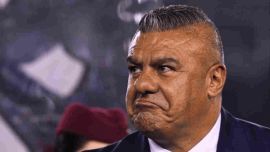Bolivians go to the polls to elect a new president on Sunday in the midst of the country's biggest economic crisis for 40 years.
But the ultimate victor faces an economic headache, with GDP set to shrink by 6.2 percent in 2020 in a country battered by the coronavirus pandemic and a slump in demand for raw materials, according to International Monetary Fund figures.
"We are very close to a serious economic crisis," said Roberto Laserna, an economist with the Fundacion Milenio think tank.
The country of 11 million with a precarious public health infrastructure has struggled to cope with the pandemic, with 137,000 infections and more than 8,000 deaths to date.
Laserna said the health crisis has highlighted the structural inadequacies of Bolivia's economy, listing slowing growth since 2014, a public deficit increase and a growing trade imbalance and debt. Added to this is a continuous fall in foreign reserves, from US$8.9 billion in 2018 to US$6.2 million in June 2020.
The economic deterioration, coupled with continuing political uncertainty, led ratings agency Moody's to recently downgrade Bolivia's debt rating from "B1" to "B2."
Despite this, former economy minister Luis Arce – the man behind an economic policy that for more than a decade prioritised exploitation of Bolivia's natural resources – is leading the polls ahead of Sunday's presidential election.
The policy, put in place in 2006, was largely based on the nationalisation of hydrocarbon and mineral exploitation, helping lift millions of Bolivians out of poverty and finance infrastructural development.
'Super cycle'
The Andean country has large reserves of lithium, gas, iron ore and copper.
"It's a model aimed at promoting consumption – a model compatible with a 'super cycle' for raw materials, which boosts government income and increases consumer spending, so that people consume and the economy grows," Javier Aliaga, a researcher at the Inesad Center for Economic Studies, told AFP.
Sunday's election comes a year after the poll that would have given Evo Morales a record fourth term. The voting result was annulled amid social unrest, and Morales' government was replaced with a right-wing interim administration led by former senator Jeanine Áñez.
Áñez recently pulled out of the election race after trailing in the polls.
Endorsed by Morales, now exiled in Buenos Aires, as the standard bearer for his largely indigenous Movement for Socialism (MAS) party, Arce has a clear lead over centrist candidate Carlos Mesa.
According to the International Monetary Fund, Bolivia experienced more than four percent annual growth in the 13 years Morales was in his power.
GDP growth peaked in 2013 at 6.8 percent, helping Morales – the country's first indigenous president – to slash poverty rates from 60 percent to 37 percent, according to official figures.
But when the prices of raw materials – which account for 80 percent of the country's exports – plummeted, Morales continued to inject money into the economy by drawing on foreign reserves and increasing the public deficit, experts point out.
Public debt reached an all-time high of US$11 billion, or 27 percent of GDP, by the end of 2019, according to the Central Bank, though it was still among the lowest in the region.
Plummeting oil and gas prices due to the pandemic have only aggravated the situation.
In addition, the introduction of exchange controls to quell inflation "reduced the chances of exporters being more competitive, with a knock-on effect on the trade balance and a drag on foreign reserves," Aliaga said.
Defending the record
Arce has defended his record during the campaign.
"We have taken appropriate decisions that have led our country to be at the top of several economic and social indicators in the region," he said.
He added that Bolivia must "find the path of stability and economic growth in the context of social justice."
Mesa, a 67-year-old who was president from 2003 to 2005, has countered that he wants to strengthen economic diversification, ruling out re-privatising the state-owned hydrocarbon company and its subsidiaries.
Instead, he said, they need to be "made more efficient."
Arce has consistently led across a swath of opinion polls, but analysts believe voting will be close, and Mesa will keep any gap within the 10 percentage points he needs to force a second round runoff on November 29.
by Gerardo Bustillos, AFP

























Comments